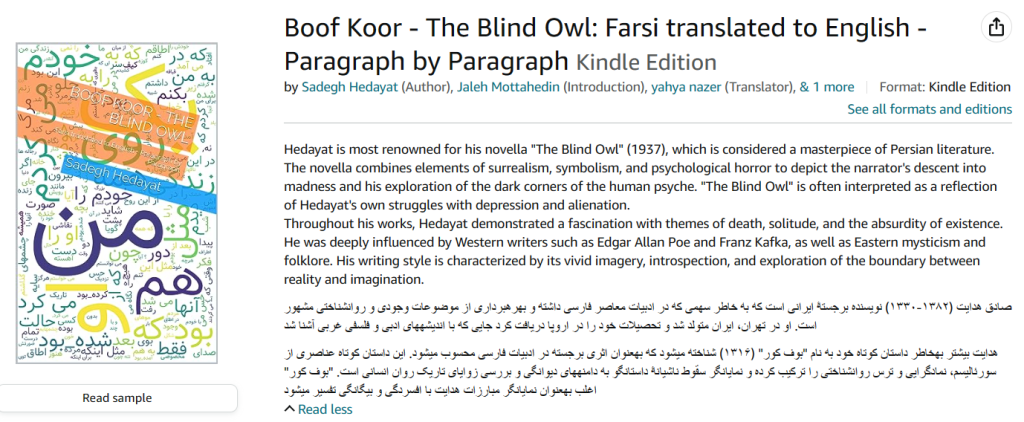Shop-Books
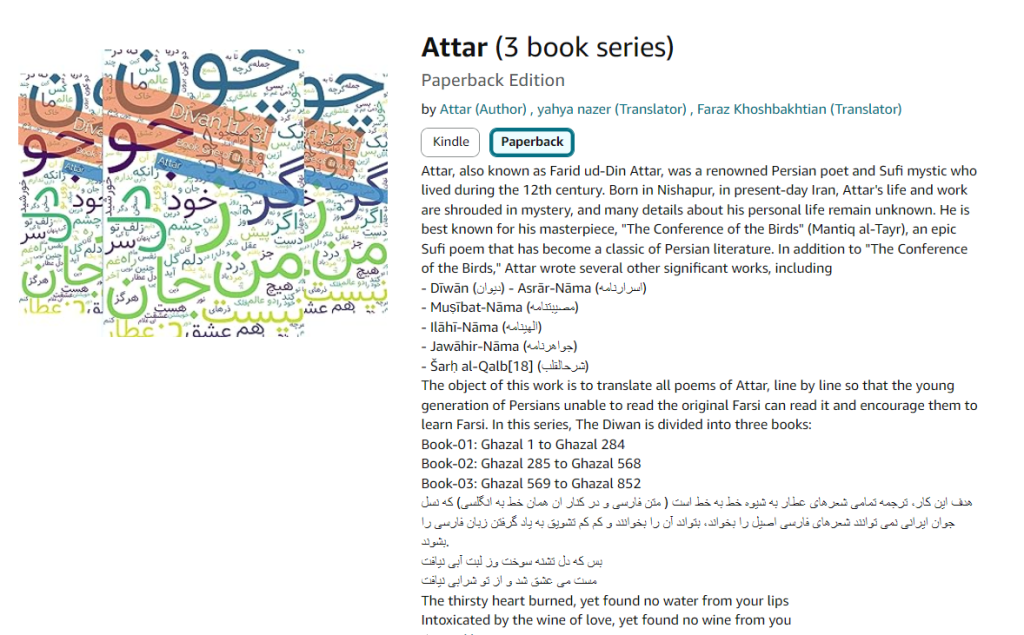
Shahnameh (Ferdowsi): The Shahnameh, also known as the Book of Kings, is a long epic poem written by the Persian poet Ferdowsi in the 10th and 11th centuries. It chronicles the history and myths of Iran from its creation to the Arab Islamic conquests in the 7th century. The Shahnameh is divided into three parts,The mythical, the heroic, and the historical:
- The mythical section tells the stories of the pre-Islamic gods and heroes of Iran, including the creation of the world, the first king, and the heroic deeds of the legendary hero Rustam.
- The heroic section tells the stories of the Persian kings and heroes from the reign of Keyumars to the fall of the Sassanian Empire.
- The historical section covers the Islamic conquest of Iran and the subsequent dynasties.
Ferdowsi wrote the Shahnameh in Persian, using a Persian vocabulary, and the poem has significantly impacted Persian culture and identity. It is considered a masterpiece of Persian literature and has been translated into many languages. The Shahnameh remains an important source of Iranian history and culture and is still widely read and celebrated today.
The object of this work is to translate all poems of Shahnameh, line by line so that the young generation of Persians unable to read the original Farsi can read it and encourage them to learn Farsi.
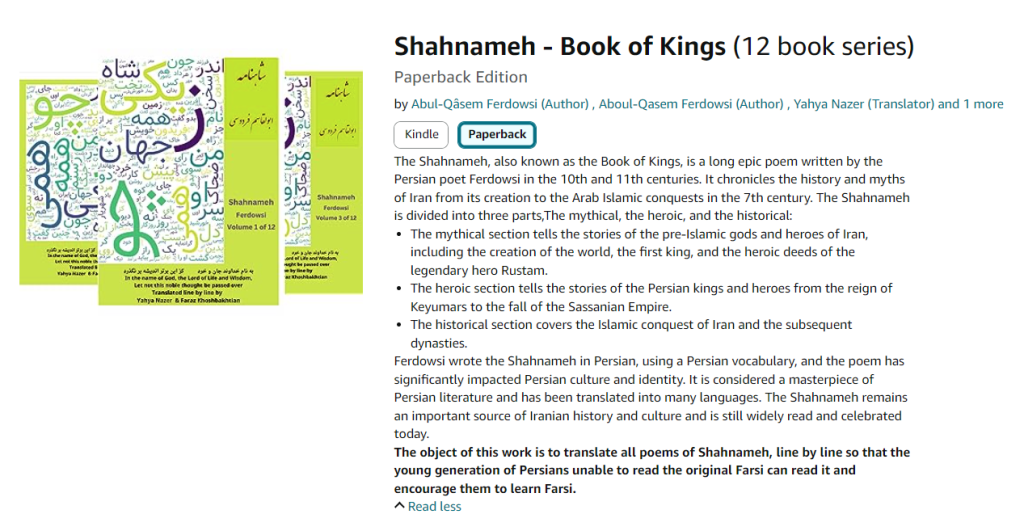
Divan Hafez: Hafez, also known as Khwāja Shams-ud-Dīn Muḥammad Ḥāfeẓ-e Shīrāzī, was a Persian poet from the 14th century. He is considered one of the greatest poets of all time, and his works are still widely read and celebrated in Iran and other Persian-speaking countries. Hafez’s poetry is known for its beauty, lyricism, and depth of meaning, and his verses often deal with themes of love, spirituality, and the human condition. His works have been translated into many languages, and his influence can be seen in the works of many other poets and writers. The object of this work is to translate all poems of Hafez, line by line so that the young generation of Persians unable to read the original Farsi can read it and encourage them to learn Farsi.
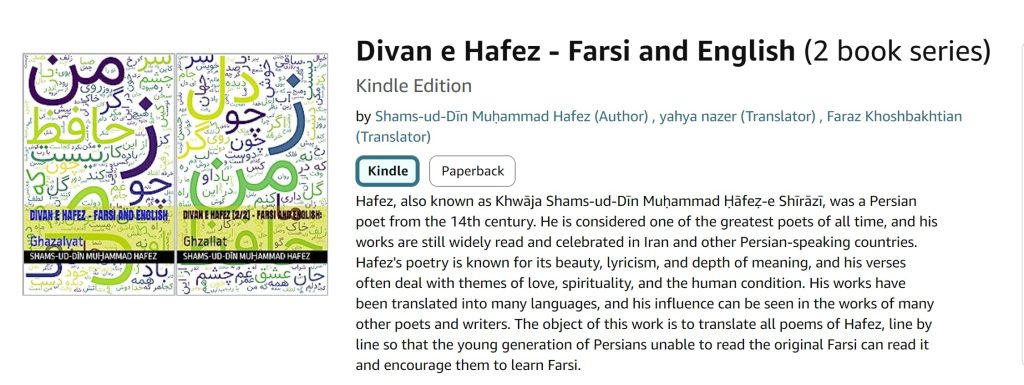
Khayyam + FitzGeral:This book is divided into two parts:
- The Rubaiyat of Omar Khayyam.
- The Rubaiyat of Edward FitzGerald (inspired by Khayyam).
Omar Khayyam, known as a prominent Persian poet, mathematician, and philosopher, lived during the 11th and 12th centuries. He was born in Nishapur, Iran, in 1048. Khayyam is most celebrated for his poetic works, particularly his collection of quatrains (rubaiyat), which were written in Persian and later translated into various languages. His poetry often explores themes of love, life’s fleeting nature, the pursuit of knowledge, and the existential aspects of existence. One of his famous themes is the hedonistic approach to life, emphasizing the enjoyment of the present moment and the pleasures of life, as he famously wrote:
هفتاد و دو سال فکر کردم شب و روز
معلومم شد که هیچ معلوم نشد
Seventy-two years I pondered day and night,
I realized that nothing became clear.
Edward FitzGerald was a British poet and writer known for his renowned work, “The Rubaiyat of Omar Khayyam” FitzGerald’s most significant literary achievement was his translation and interpretation of the quatrains (rubaiyat) attributed to the Persian poet and philosopher Omar Khayyam.
The object of this work is to translate all poems of Khayyam and FitzGerald, line by line so that the young generation of Persians unable to read the original Farsi can read it and encourage them to learn Farsi.
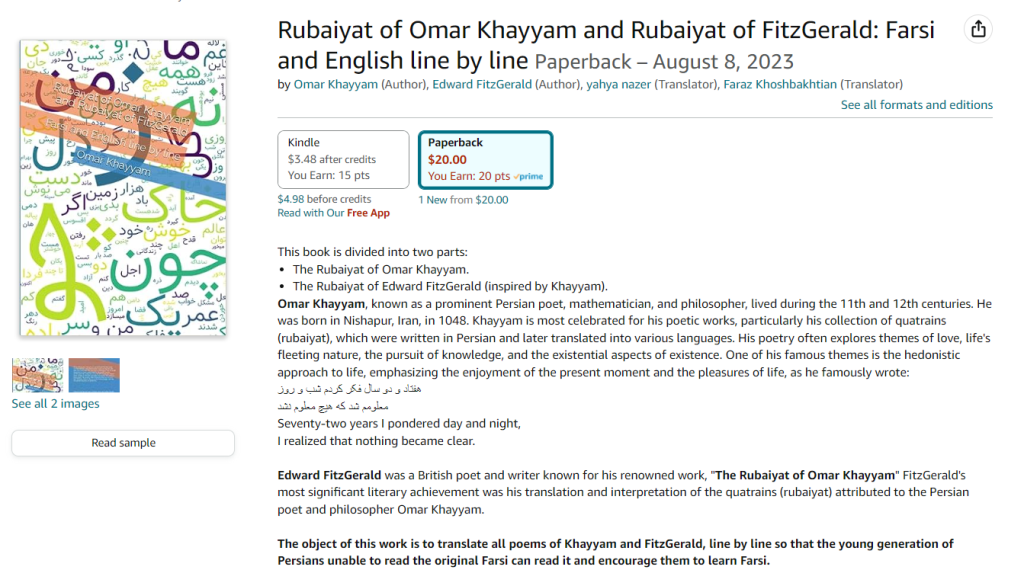
Divan Shams – Rumi:Divan Shams is a collection of poems written by the Persian poet and Sufi mystic Mawlānā Jalāl-ad-Dīn Muhammad Balkhī, also known as Rumi. A compilation of lyric poems written in the Persian language, it contains 3,230 ghazals. While following the long tradition of Sufi poetry as well as the traditional metrical conventions of ghazals, the poems in the Divan showcase Rumi’s unique, trance-like poetic style. Written in the aftermath of the disappearance of Rumi’s beloved spiritual teacher, Shams-i Tabrizi, the Divan is dedicated to Shams and contains many verses praising him and lamenting his disappearance. Although not a didactic work, Divan still explores deep philosophical themes, particularly those of love and longing. The object of this work is to translate all poems of Shahnameh, line by line so that the young generation of Persians unable to read the original Farsi can read it and encourage them to learn Farsi.
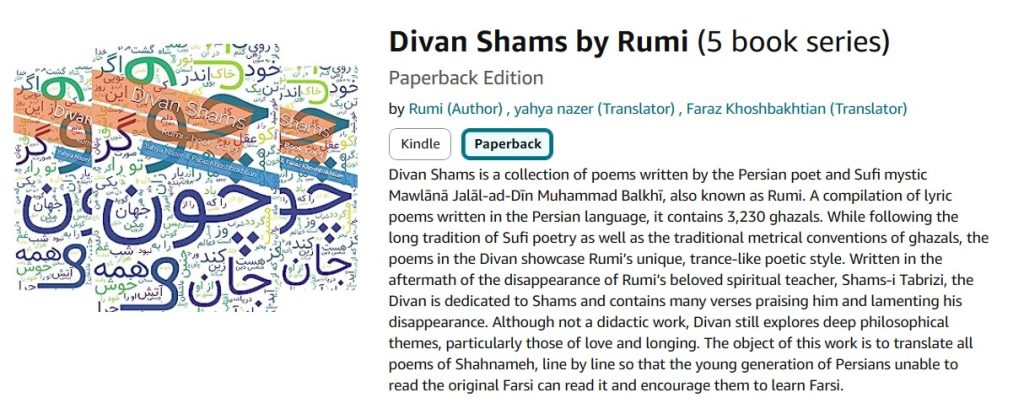
صادق هدایت (۱۳۸۲-۱۳۳۰) نویسنده برجستهٔ ایرانی است که به خاطر سهمی که در ادبیات معاصر فارسی داشته و بهرهبرداری از موضوعات وجودی و روانشناختی مشهور است. او در تهران، ایران متولد شد و تحصیلات خود را در اروپا دریافت کرد جایی که با اندیشههای ادبی و فلسفی غربی آشنا شد هدایت بیشتر بهخاطر داستان کوتاه خود به نام “بوف کور” (۱۳۱۶) شناخته میشود که بهعنوان اثری برجسته در ادبیات فارسی محسوب میشود. این داستان کوتاه عناصری از سورئالیسم، نمادگرایی و ترس روانشناختی را ترکیب کرده و نمایانگر سقوط ناشیانهٔ داستانگو به دامنههای دیوانگی و بررسی زوایای تاریک روان انسانی است. “بوف کور” اغلب بهعنوان نمایانگر مبارزات هدایت با افسردگی و بیگانگی تفسیر میشود
